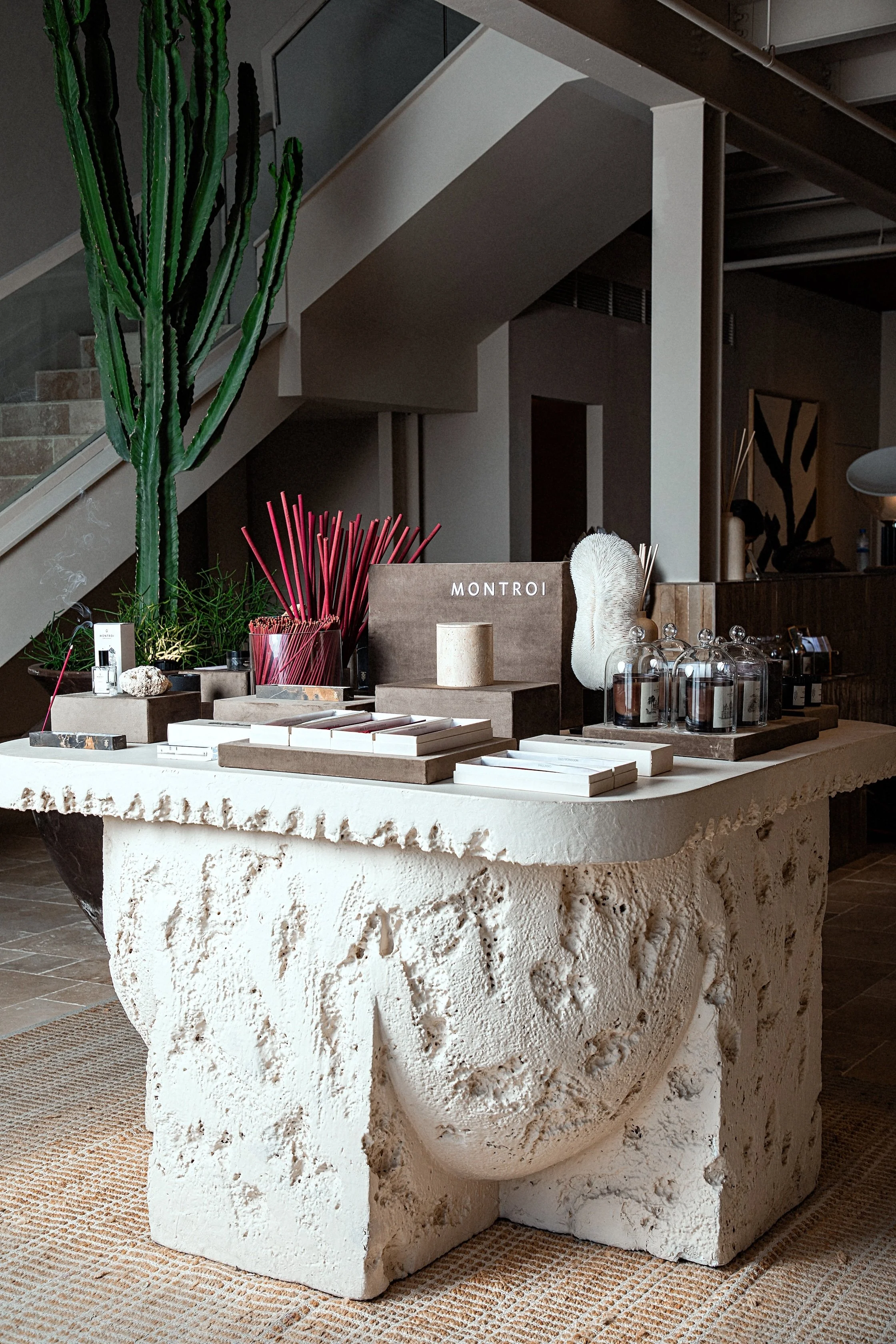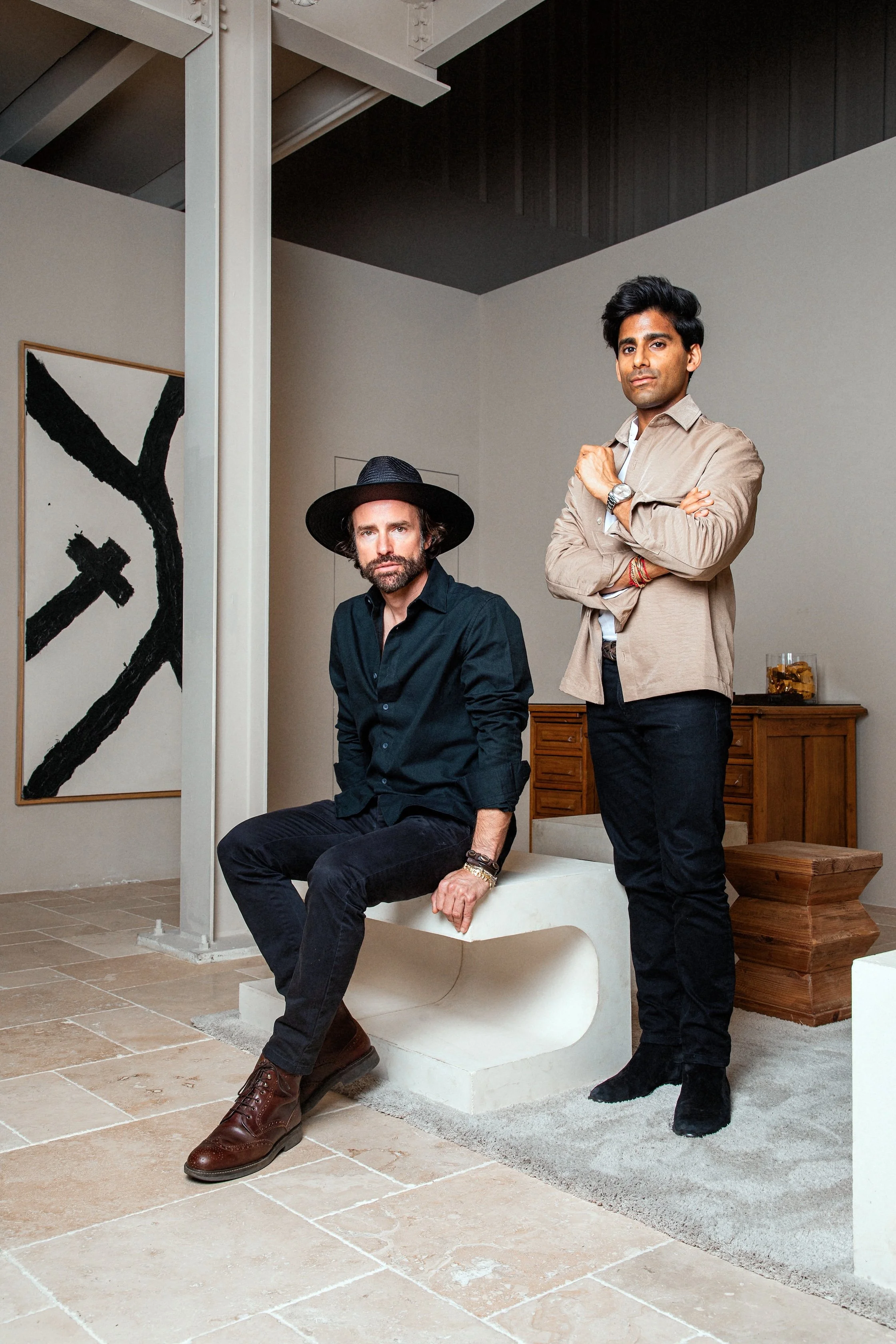The Essence of Montroi & the art of slow luxury
Enrique Hormigo-Scarlett and Samir Aghera
Dubai’s Alserkal Avenue hums with creativity — but step inside Montroi’s flagship studio and the pace shifts. Here, the air is laced with oud, incense, and leather. The tables, nooks, and coves of the boutique invite conversation, and every object feels as if it’s been on a journey of its own.
It’s not merely a store; it’s an experience. Low-slung tables invite guests to linger, shelves display objects like museum artifacts, and a long counter — suggestive of a bar — offers not cocktails, but the language of scent and craft. It is here, in the warm stillness of Dubai’s creative district, that Montroi’s philosophy comes alive: luxury is not in the excess, but in the soulful, the handmade, and the enduring.
Founded by Enrique Hormigo-Scarlett and Samir Aghera, Montroi is not a brand to be consumed quickly. It is a philosophy of modern nomadism, built on the belief that the most valuable possessions are those with stories to tell. From the hand-painted leather of Jaipur to the rose absolutes of Grasse, every Montroi piece is a chapter in a larger atlas — a Silk Route of craft, memory, and cultural exchange.
“We were both at a point in our lives where we wanted fewer things, but better quality — objects with a soul,” they explain. Their professional lives had taken them across the Middle East, North Africa, and Europe, encountering artisans who had been perfecting their craft for generations. The idea of working with them came naturally.
Their travels became the blueprint for Montroi — a modern-day Silk Route that connects makers to modern nomads. “It’s not just about selling a bag or a fragrance,” says Enrique, “it’s about sharing the story of the hands that made it.”
The flagship at Alserkal Avenue is Montroi’s most tangible expression of its ethos. The space is not arranged for speed or turnover, but for discovery and connection.
“We call it a meeting point for nomads,” they say. “It’s a space to experiment and learn — whether that’s perfume blending, oriental scent workshops, or hand-painting leather goods. Guests can linger, discover, and participate in cultural exchange.”
Weekly workshops are a core part of the experience: perfume-making classes, oriental scent explorations, and the delicate art of leather painting. Each session is a chance to step into the world of artisanship — to see, smell, and touch the process that gives life to Montroi’s products.
For Montroi, luxury has nothing to do with price tags or scarcity for its own sake. “For us, luxury is about emotional value. A product with a soul — because of its materials, the way it’s made, the story it carries. We run small productions, number each piece, and welcome variations in handmade work. It’s real, imperfect in the best way.”
This mindset extends well beyond the sale. Montroi offers repair and personalisation services, encouraging customers to extend the life of their purchases. There are also “pre-loved” sales of Montroi items that have already travelled the world — objects that arrive with a history written into their surfaces.
“A leather bag that’s been somewhere,” Samir notes, “is infinitely more interesting than one that hasn’t left the shop.”
At Montroi, creativity begins not in a design studio but in dialogue with artisans. “Always with the artisan,” they emphasise. “We listen to their ideas and respect their mastery. Our creative direction exists to support their craft, not override it.”
This humility — rare in luxury branding — means Montroi’s collections evolve organically. Some pieces emerge directly from artisan suggestions; others are prototypes refined over months of conversation and iteration.
The concept of the nomad runs through Montroi’s work like a guiding thread. “A nomad learns from every culture, takes the best of each place, and celebrates it. We hope our products inspire people to explore, to connect, to be more curious. If everyone was a little more nomadic, the world would be a better place.”
This is not about bohemian romanticism for its own sake — it’s about fostering cultural curiosity and respect. Montroi’s products are designed to be portable yet permanent, encouraging their owners to live with fewer, better things that can travel anywhere.
“Heritage is in our DNA,” they say. “We work with artisans whose skills are centuries old. But we make sure pieces fit contemporary spaces and lifestyles. Montroi is a contemporary romantic project.”
That balance is evident in everything from minimalist leather travel bags to ornate incense holders. The design language is clean and understated, yet rooted in techniques passed down through generations.
In an era where luxury brands flood billboards and Instagram feeds, Montroi has chosen another path. “We prefer discovery over mass reach. Our slow-life mindset doesn’t fit with high-volume retail. Relationships matter more than numbers. All our productions are limited and numbered. We like being the brand you find rather than the brand that finds you.”
The choice to remain small-scale is as much philosophical as strategic. “We’re only thirty people,” they note. “That lean structure means we don’t have to chase sales just to survive — we can stay true to the project.”
Being based in Dubai has been a strategic gift. “From here we can travel East and West with ease, revisiting the Silk Route in real time,” they say. “It gives us access to artisans whenever we need, and keeps us connected to both heritage and modernity.”
This location also reinforces Montroi’s identity as a cultural bridge — a place where influences from Europe, the Middle East, Africa, and Asia naturally converge.
Self-funding, they admit, has been both liberating and challenging. “Without investors, we’ve kept our integrity — but it meant navigating tight resources at the start.” The payoff has been complete creative freedom, a rare commodity in an industry dominated by corporate-backed luxury conglomerates.
Montroi’s scope has already stretched beyond objects. “We’ve been tempted to take clients on trips to meet artisans,” they admit. “Many ask to join us. We’ve partnered with One&Only Resorts, creating signature scents for their properties. It’s about building memories, not just products.”
The partnership with One&Only is emblematic of Montroi’s approach — intimate, bespoke, rooted in place. Each scent is tailored to a location, capturing its essence in a way that endures long after the guest has left.
When asked who they imagine carrying Montroi, the answer is simple: “Anyone who values quality and will treasure the product. We’re not trying to reach everyone, just the right ones.”
The future is already in motion. Montroi is developing a new space in another country, designed to immerse guests even further into its world. A capsule collection for the upcoming One&Only resort in Montana is also in the works. As with everything they do, the goal is not speed, but depth.
“It’s always about enjoying the journey,” they say.
As we leave the Alserkal studio, a guest is hand-painting a leather wallet while another is weighing scents for a bespoke perfume. The founders move easily between them, part hosts, part collaborators.
Montroi’s magic lies in this — an ability to slow time, to invite you into the story of an object, to make you part of a lineage of craftsmanship that stretches back centuries and across continents.
Here, luxury is not a fleeting indulgence. It is a passport stamped with history, a companion that becomes more beautiful the longer it travels with you. And like the Silk Route that inspires it, Montroi’s path is one of connection — between places, between people, and between the soul and the things it chooses to keep.















